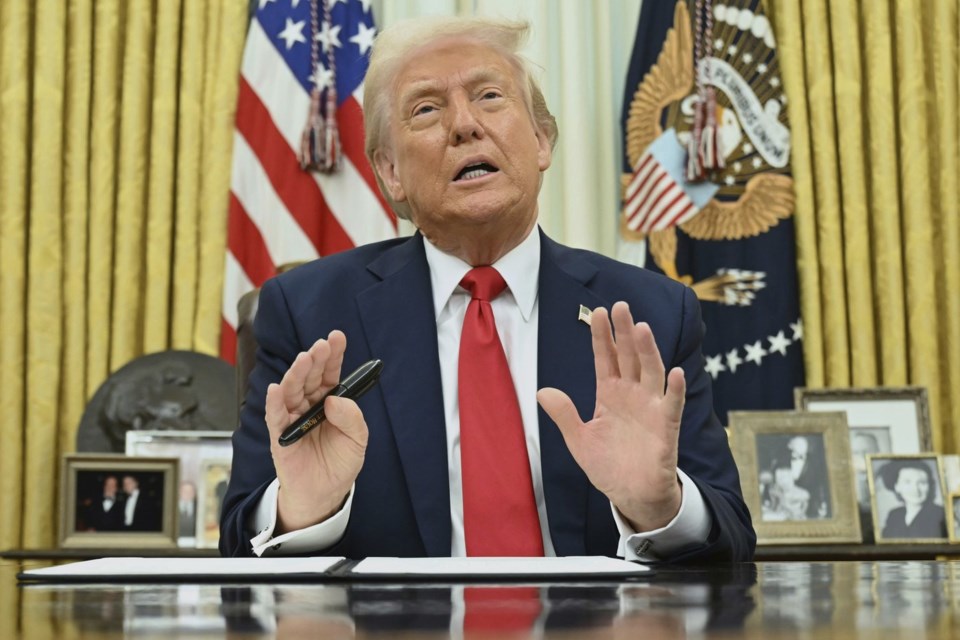WASHINGTON (AP) — President Donald Trump says his executive orders targeting law firms are being issued in the name of national security, with the White House asserting that the firms don't deserve access to sensitive U.S. government information.
But the firms fear the orders are being written so broadly as to potentially weaken national security by calling into question the status of security clearances of lawyers who, in addition to their legal practice, serve as military reservists and require their clearances to report to duty.
It's an example of the sweeping and sometimes unintended consequences of White House efforts to reshape civil society, with those affected in some instances not necessarily being the ones who were top of mind when the Trump administration announced the actions in the first place. Military veterans, for instance, have not been spared from Trump's ongoing slashing of the federal government.
Trump's law firm executive orders have generally targeted firms that have associations with prosecutors who previously investigated him or employ, or have employed, attorneys he perceives as political adversaries. The orders have consistently imposed the same consequences, including threatening the suspension of all active security clearances held by employees at the singled-out firms.
Security clearances are issued for government workers and contractors who require access to classified national security information as part of their job. The federal government has broad discretion over who does and who does not obtain a clearance.
It's unclear how many lawyers at the four firms who remain subject to executive orders — several others have averted them through settlements with the White House — hold security clearances either through their jobs or other work, or whether the Trump administration would move forward with plans to revoke the clearances of military reservists.
A White House spokesman, asked for comment, pointed to the provision of the order that says the clearances are to be suspended “pending a review of whether such clearances are consistent with the national interest.” The response seemed to suggest that clearances of reservists could potentially be spared.
In the meantime, though, the issue was raised during a court hearing Friday in which a lawyer representing WilmerHale, one of the targeted firms, noted that the firm has within its ranks military reservists who have security clearances. Another firm that's been subject to an executive order, Perkins Coie, also has said that it employs military reservists.
“I don’t think for a minute the government lawyer is going to come up here and tell you that they actually intended to suspend the reservists’ security clearances," Paul Clement, a prominent Washington appellate lawyer who is representing WilmerHale, told the judge. “But they’re painting with such a broad brush with this thing, they aren’t distinguishing sheep from goats at all.”
He said Friday that “two of those lawyers have to report for their reserve duty next week. Now, I can’t tell you for sure that they’re going to show up and they’re not going to be able to do their job because their security clearance has been suspended.”
A person familiar with the matter, who insisted on anonymity to describe non-public information, said about a half-dozen WilmerHale employees are reservists.
Several firms, including WilmerHale and Perkins Coie, have succeeded in winning court orders temporarily blocking enforcement of certain sections of the executive orders. The security clearance provisions, though, have remained in effect, a reflection of a president's expansive powers when ordering the suspension or revocation of clearances.
Dan Meyer, a lawyer who specializes in security clearances at the Tully Rinckey law firm — which is not among those targeted by the executive orders — said that he assumed the number of attorneys at major law firms is small and that it was possible military reservists might be able to keep their clearances, but it could conceivably require a lengthy adjudication.
“It may be that word will go quietly from the White House, ‘Don’t screw with any of these reservists at these law firms,’” Meyer said.
But, he added, “If the cat wants to claw the mouse, there’s an opportunity to do it.”
Eric Tucker, The Associated Press



